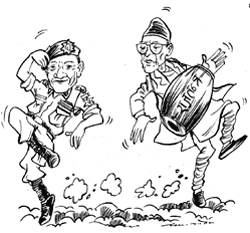 At a crucial time, when we should be moving towards a democratic republic through a constituent assembly, Lieutenant General Rukmangat Katuwal has been appointed acting Chief of Army Staff. This is the first time in the army's 238-year-old history that a Katuwal Chettri has been appointed to the post that is usually filled by Shah, Rana, Thapa and Basnet clans. His appointment may seem like there is finally some inclusiveness in the army.
At a crucial time, when we should be moving towards a democratic republic through a constituent assembly, Lieutenant General Rukmangat Katuwal has been appointed acting Chief of Army Staff. This is the first time in the army's 238-year-old history that a Katuwal Chettri has been appointed to the post that is usually filled by Shah, Rana, Thapa and Basnet clans. His appointment may seem like there is finally some inclusiveness in the army.
Katuwal is perhaps proud of himself that in the history of his ancestors this is the first time someone has reached such a high position. On such an auspicious occasion he will no doubt remember his godfather King Mahendra. Neither will he ever forget the Prime Minster and Defence Minister Girija Prasad Koirala for giving him this opportunity despite people's expectations that Katuwal would be shown the door, if not jailed.
This general has been promoted for extending the tenure of the royal government by using all possible means-murders, kidnappings, teargas, and brutal force-during the April movement. Within a month Katuwal will be promoted from acting to full Chief of Army Staff by the grace of Girija Prasad Koirala. If the Prime Minister isn't around, Speaker of the House, Subhas Nembang will administer the officeal oath of secrecy to Katuwal in the parliament and declare him COAS. Girija Prasad's leadership of the democratic government will make true the old Nepali adage 'slay the victim and reward the robber'.
Rukmangat's rise is not unnatural along the road that premier Koirala and vice-premier KP Oli are leading the nation. It is easier to learn how to change loyalty reading Diamond Shamsher's book Seto Baag than to endure the hardships of creating policies on the basis of social science without the ideological impracticalities of socialist and communist thought. Like in the book, when the same courtiers who were praising Jagat Jung, ran off to the Seto Darbar to show their loyalty to Bir Shamsher as soon as they heard rumours of Jagat Jung's murder, the Pyar Jungs and Rukmangats have started praising Koirala and Oli. Even though these two leaders say they are democratic, feudalism runs in their blood.
Many of the major papers are prioritising the issue of decommissioning the Maoist army. The ambassadors of the US, the UK, the EU, and Japan all agree: 'The Maoist army and the (Royal) Nepal Army are not the same, their levels cannot be the same.' Oli keeps repeating, 'The Maoists can only join the interim government after they give up their weapons.' Everyone knows that had there been no 12-point agreement between the parties and the Maoists, and the students and youth had not shed their blood demanding a republic, that had the Maoist army not backed the movement, both Oli and Koirala would be rotting in Gyanendra's jails. It's worth asking who Oli is answerable to, and why Koirala is tacitly keeping the old structure. This is not an attack against an individual. Atrocities and crimes committed by the army are aplenty. Granted their loyalty has changed and they are now loyal to the UML Congress leadership. But who will guarantee that the king and army will accept it if tomorrow the majority decides to move towards a republic?


